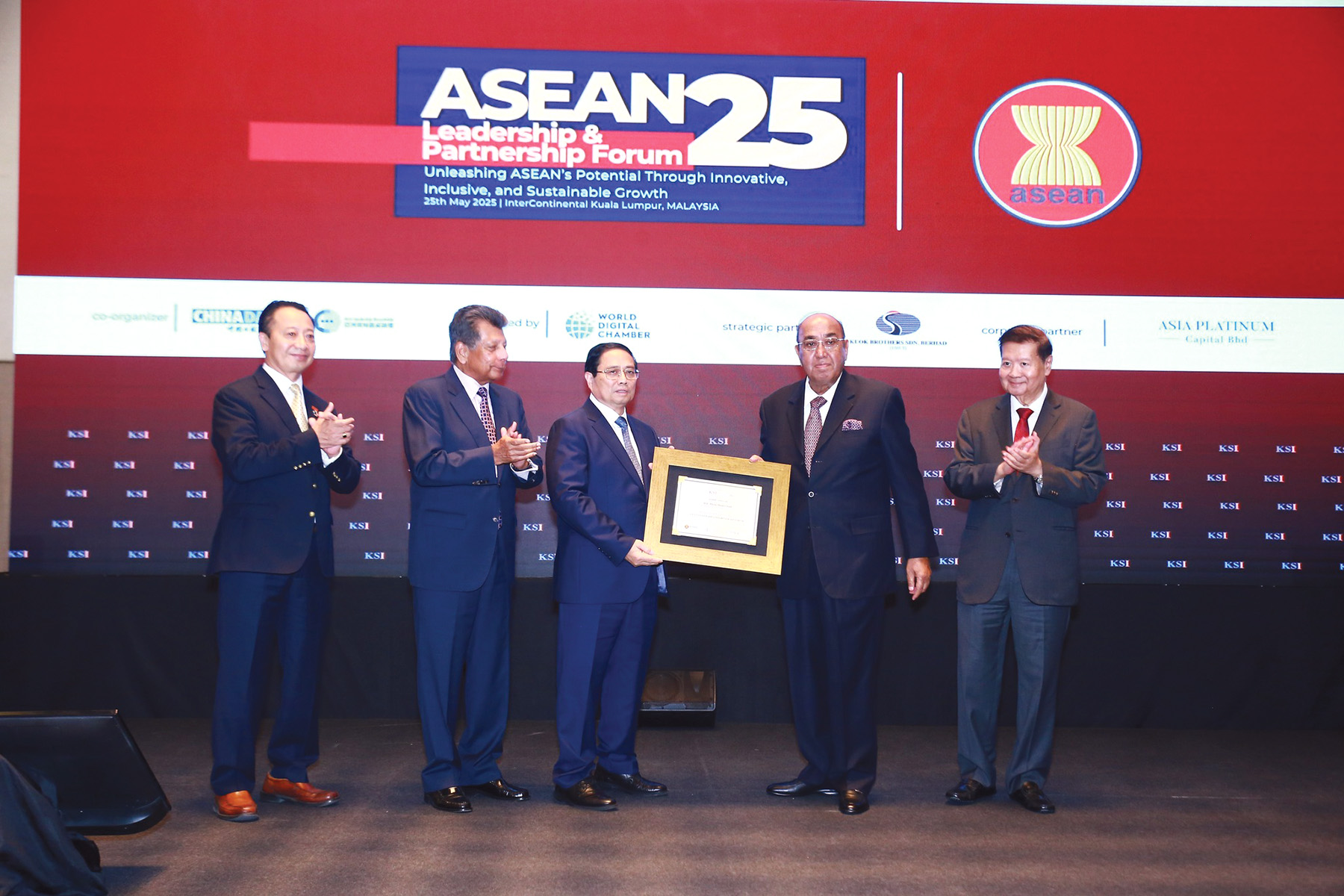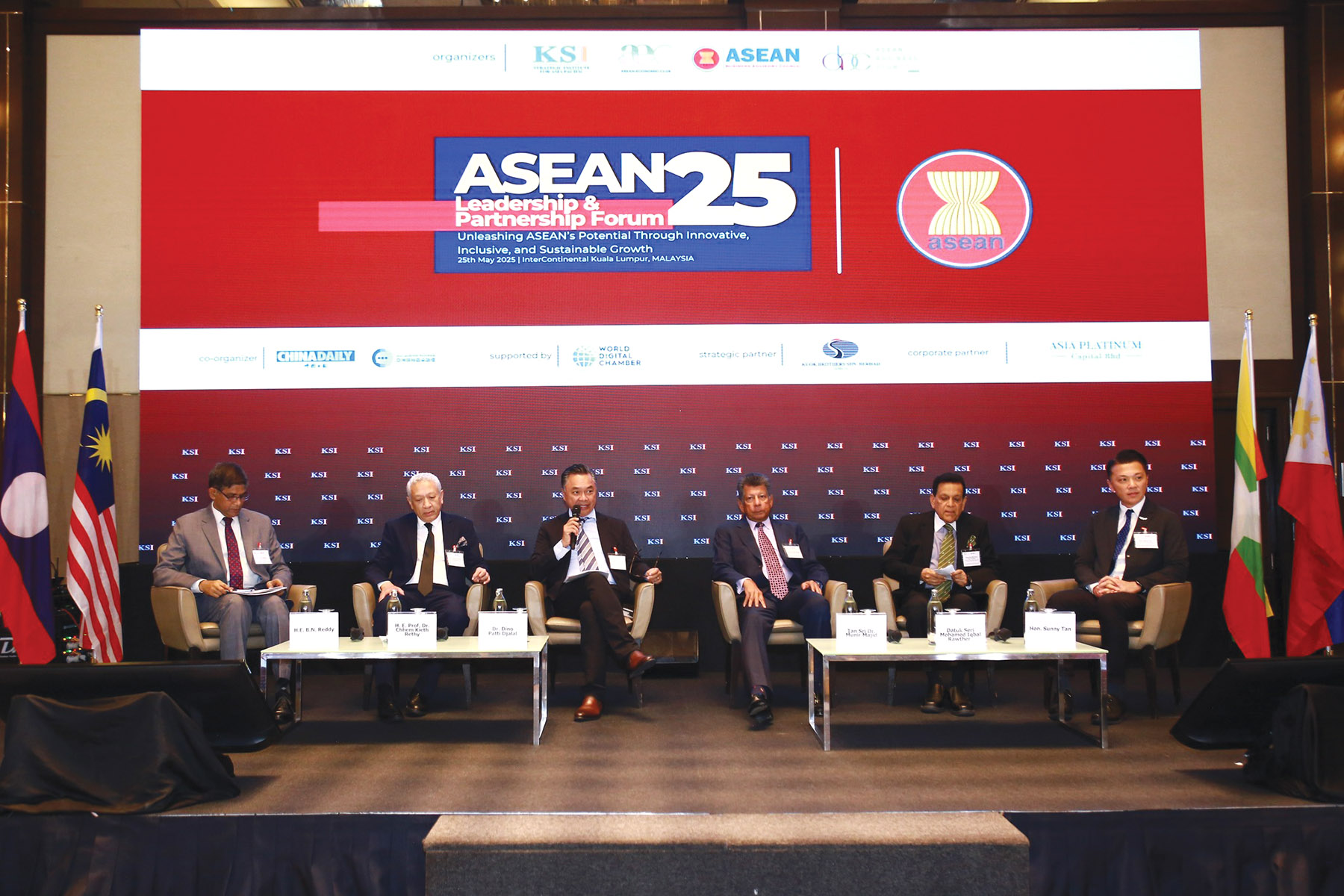Forum hears bloc’s role in peace, economic well-being more vital than ever amid global challenges

Leaders of the Association of Southeast Asian Nations (ASEAN) stressed the bloc’s “indispensable” role in safeguarding regional peace and economic well-being amid rising geopolitical tensions and US trade protectionism.
“In this challenging environment, ASEAN’s role is more indispensable than ever to safeguard the foundations of regional cooperation and sustain the hard-won peace and shared prosperity,” said ASEAN Secretary-General Kao Kim Hourn on May 25.
Kao was addressing the 2025 ASEAN Leadership and Partnership Forum held in Kuala Lumpur, Malaysia, via video, ahead of the 46th ASEAN Summit on May 26-27 in the same city.
To strengthen ASEAN’s leadership and partnership to respond effectively to emerging challenges and opportunities, Kao said it is necessary to continue strengthening economic integration, advancing ASEAN’s forward-looking economic agenda, and diversifying economic partnerships.
As the global economy confronts headwinds from rising protectionism and escalating trade tensions that threaten the region’s sustainable and inclusive growth, ASEAN must stand firm in defending an open, rules-based, and predictable trading system, Kao said
He added that ASEAN’s leadership is grounded in strong, inclusive partnerships built on mutual respect, non-discrimination, and shared interests.
Speaking at the forum, Vietnamese Prime Minister Pham Minh Chinh said ASEAN countries must promote multilateralism jointly because no single country can alone address the various challenges the world faces today.
“It is necessary for us to stand united to resolve global challenges with cooperation so as to bring about a life of peace, progress, and sustainable development for humanity as a whole,” said Chinh.
He called on the business community to contribute to ASEAN resilience and help connect regional supply chains for shared prosperity.
“With the global economic landscape rapidly shifting in an unknown direction, ASEAN cannot afford to be reactive,” said Cambodian Prime Minister Hun Manet.
Hun Manet, whose speech was delivered by Sok Siphana, Cambodia’s senior minister of special missions in charge of multilateral trade and economic affairs, said it is necessary for the bloc to proactively position itself as an attractive destination for investors, leveraging various free trade agreements, and the strategic ties with key global markets.
Though the global challenges cannot be downplayed, Hun Manet said the region should take more measures to promote transformation toward digitalization and the green economy in an inclusive way that can translate economic success into real benefits for the people.
Thai Prime Minister Paetongtarn Shinawatra, who also addressed the forum via video, told attendees that advancing women’s leadership is critical to the bloc’s inclusive and sustainable future.
“I believe that empowering women will unlock the potential of half its population and bring tangible benefits to our societies, as women can play a transformative role in socioeconomic development,” she said.
To achieve this, Paetongtarn called for enhancing regional cooperation, investing in education and financial inclusion for women, and removing barriers to ensure equal rights and opportunities for leadership at all levels.
Under the theme “Unleashing ASEAN’s Potential Through Innovative, Inclusive and Sustainable Growth”, the forum was organized by ASEAN Economic Club (AEC), ASEAN Business Club, ASEAN Business Advisory Council, and the KSI Strategic Institute for Asia Pacific. The forum is held annually in the country that holds the rotating ASEAN chair.
China Daily was a co-organizer of the May 25 event.
“Globally, the world is talking of a ‘Great Reset’ and (it) should include ASEAN,” said Michael Yeoh, chairman of the ASEAN Economic Club and president of the KSI institute.

ASEAN is facing challenges in disruption and digitalization, he said, expressing hope that member countries can work together to build a more united bloc with a better and more sustainable future.
In his welcoming remarks via video, Zhou Li, deputy editor-in-chief of China Daily, said the China-ASEAN partnership “has created opportunities that extend beyond borders, benefiting millions across the region”.
The forum brought together 400 delegates from government, business, and academics from ASEAN and beyond to discuss innovation, digital transformation, investment, green growth, and public-private-people partnerships.
As a highlight of the forum, the Special ASEAN Excellence Award was presented to Vietnamese Prime Minister Chinh in recognition of his outstanding leadership and contributions to regional cooperation, economic resilience, and sustainable development in ASEAN.
The forum also featured the presentation of ASEAN Excellence Awards to a select group of individuals, organizations, and institutions from across the region.
In an interview with China Daily, Sok, the senior minister of special missions of Cambodia, praised the forum’s focus on the importance of ASEAN unity.
“The region has to be unified when you are dealing with different issues that are arising, such as artificial intelligence, trade diversification, green economy, and climate change,” said Sok. “These are things that no single country can deal with.”
Sok said the discussions during the forum are important as they could offer valuable ideas to governments in the region.
After moderating a panel discussion on ASEAN Leadership in an Age of Uncertainty, Dino Patti Djalal, founder of the Foreign Policy Community of Indonesia, told China Daily that ASEAN has demonstrated unique stability amid global instability.
“The world is going in the wrong direction. There are a lot of rivalries and instabilities, conflicts and mistrust, (but) ASEAN remains a region where strategic trust is high,” said Dino, noting that the bloc has shown that regionalism works.
Noting that many ASEAN countries are in trade talks with the United States after high tariff rates were announced on their exports to the US, Dino, a former vice minister of foreign affairs of Indonesia, said the negotiations must be mutually beneficial, and unilateral trade policies will never work.
“It has never been more timely and critical to discuss ASEAN leadership and partnership,” said Munir Majid, president of the ASEAN Business Club and former chairman of the ASEAN Business Advisory Council.
Noting that the foundation of ASEAN prosperity is being tested, Munir said the bloc should work to promote free trade in the Asia-Pacific region as the global trading system faces pressure from the US tariff hikes.
Wang Huiyao, founder and president of the Beijing-based Center for China and Globalization, said in a video message that all Asian countries should work together to safeguard multilateralism, free trade, and the peace that has lasted for 80 years since the end of the World War II.
Wang said the Global South is rising, with the GDP of the BRICS nations surpassing that of the Group of Seven, while Asia has also become the world’s most important economic driving engine.
The damage to global trade from US tariffs calls for ASEAN, the Chinese mainland, and the Hong Kong Special Administrative Region (SAR) to think how to develop a Plan B to stabilize the markets and minimize risks, said Sunny Tan, Legislative Council member of Hong Kong SAR and chairman of the Hong Kong Productivity Council.
“A stable environment is key to growth,” said Tan, adding that Hong Kong, by utilizing its advantages under “one country, two systems”, the common law, and professional services, can play a role in partnering with ASEAN as a stabilizer for regional trade and supply chain.
Being a witness and participant of ASEAN meetings, Delia Domingo-Albert, who is a former foreign minister of the Philippines, said she would like to describe ASEAN as a community that is connected in terms of the action plan for productivity.
“I think there is no other regional group that I can think of so diverse as ASEAN, and yet, we managed to work together,” said Albert, who emphasized ASEAN’s role in promoting regional development, safeguarding peace, and empowerment in drawing regional and global partners.
“Under Malaysia’s leadership, we anticipate significant progress in ASEAN community, collaboration and sustainable development,” said Nicholas Ho Lik-chi, commissioner for Belt and Road for the Hong Kong SAR government.
Ho noted that the Belt and Road Initiative, which is entering its next golden decade, has inspired countries and economies to share opportunities.
Ho said there is an increasing emphasis on “small and beautiful” projects, small in scale yet impactful to the local community, to foster economic development and strengthen people-to-people bonds across the region.
Contact the writer at kelly@chinadailyapac.com


